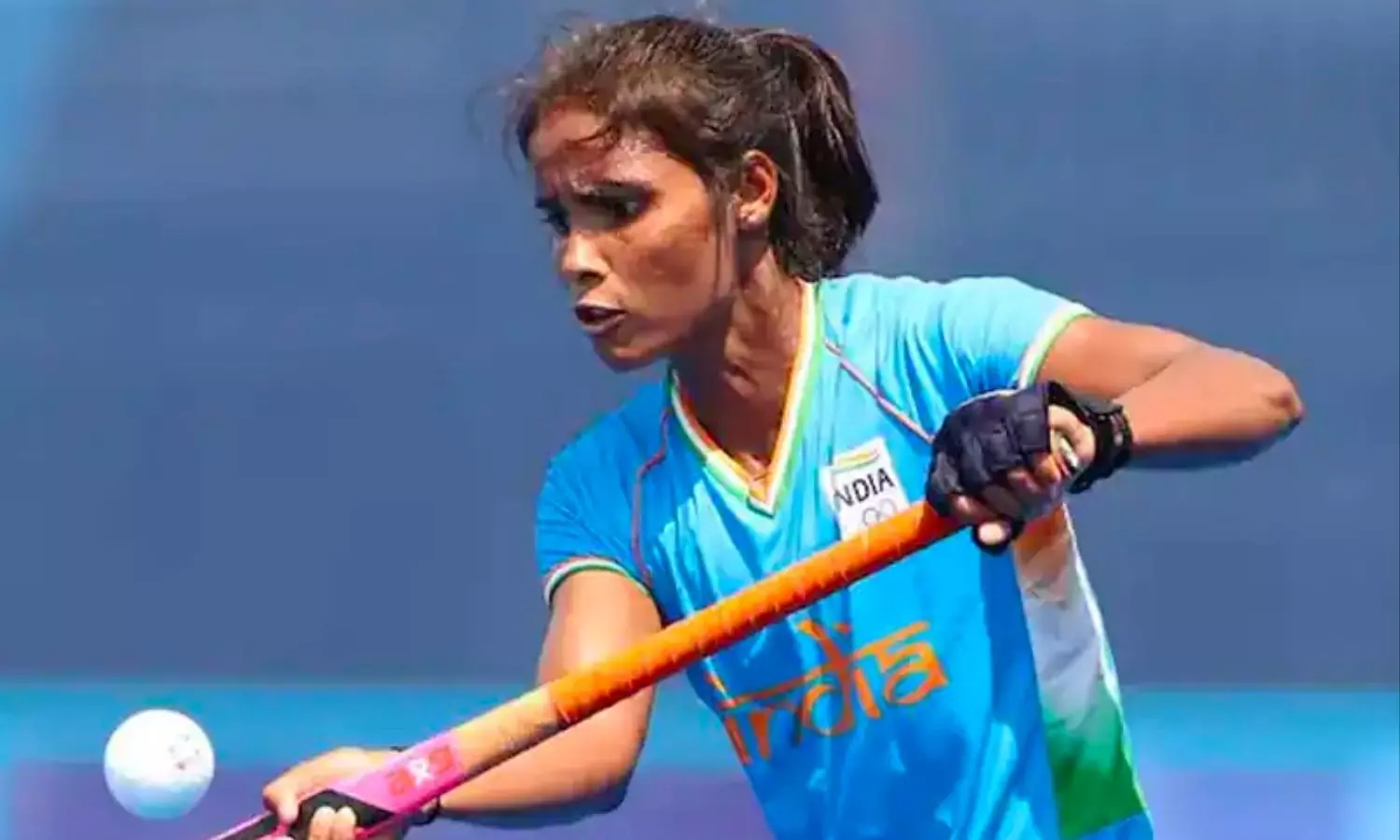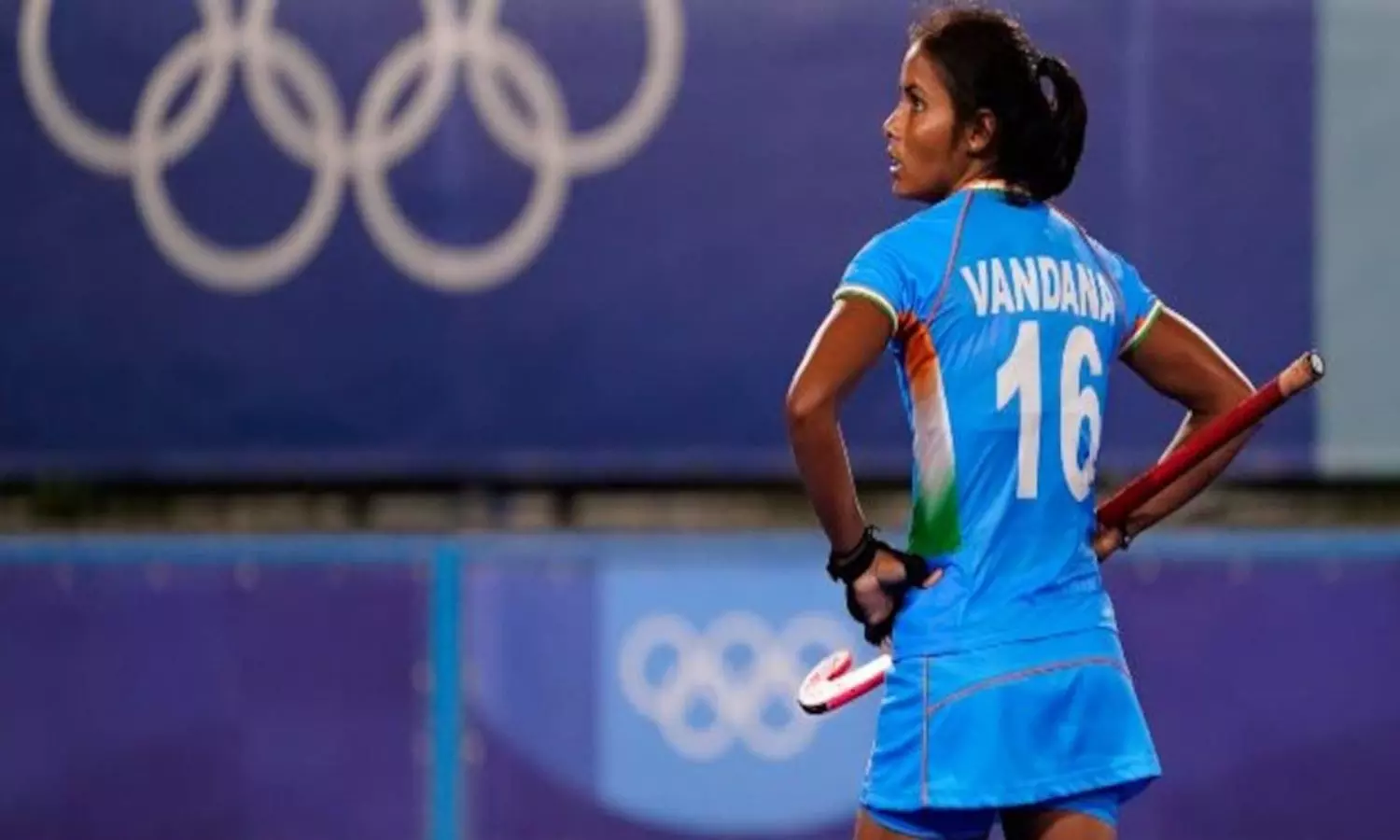Hockey
Hockey player Vandana Katariya and the ghosts of casteism in Indian sports
Caste, not merit is still seen as the first thing in India and the treatment meted out to hockey forward Vandana Katariya, is only a jarring reminder of the seamy reality.

Vandana Katariya (Source: Getty Images)
Even though the Indian Women's Hockey Team scripted their own rosy fairytale at the Tokyo Olympics, finishing fourth, back in India, the witches and dragons bared their fangs, ready to gnaw their teeth into this bubble world of happiness. These dragons don't spew fire, they spew hate, and in the cauldron of the witches lie concoctions of 'indelible' pre-existing social dogmas, ready to spill over.
While an entire nation apparently erupted in joy when the Rani Rampal-led pack of girls stormed past a formidable Australian team in the quarter finals to book themselves a ticket in the semi finals of the event, back home, in Vandana Katariya's home in Roshnabad, Haridwar, the picture would soon start looking different.
Vandana Katariya, the Indian team's most seasoned forward with 240+ matches to her credit, at 29, has fought several caste and gender battles to reach where she did, hoping against hope that people will only see her as a player with a hockey stick, making a difference on the turf rather than an 'untouchable', 'Dalit' woman contributing to the reason for the team's loss to Argentina in the semi-finals of the Tokyo Olympics.
But, Vandana Katariya failed - her hockey stick, with which she managed to etch history by becoming the first Indian woman to score a hattrick of goals against South Africa in the last Pool A draw or score the final goal on behalf of the Indian team in their bronze medal match against Great Britain - was not enough to silence the casteist slurs.
Immediately after the Indian team lost its semi-final against Argentina, upper-caste men circled the house of Vandana in Roshnabad and began bursting fire-crackers and dancing in mock-revelry and crying out that the Sjoerd Marijne coached side could not win because the team has "too many Dalits" in it. Slow claps, anyone?
"This has happened before, this will happen again." - Meena Kandasamy
In India, casteism has dug its roots deep into practically everything we see, and the sports ecosystem isn't one to scrape free of its generous presence. Therefore, while it does send shivers down the spine realizing that this is the reality that Vandana has to return to, it is hardly a one-day event. No, the ugly head of casteism keeps rising its head at every given opportunity - ready to spew venom and corrupt everything.
For a country which supposedly shook hands (ahem) and called it quits with 'untouchability' in 1950, the very fact that nearly eight decades later we are still having to counter problems regarding caste, only shows that the shaking of hands was only an act of forced formality, but not the picture of reality.
Social conditioning works in dangerous ways in a country like India and the reaction of the upper caste men to Vandana's team losing in the semi-finals of the Tokyo Olympics, while jarring, hardly comes as a surprise. If the perils of belonging to the Dalit section of the society spells a lifetime of bane, the perils of being born as a Dalit woman, is only worse by manifolds - and it is only unimaginable the amount of trauma that one has to undergo due to this double marginalization that apparently, has limited paths of remedy.
Despite the police having routinely stepped in, and routinely having carried out the arrests - duties that need to be performed courtesy of the khaki they wear, will it really make a difference? Can we guarantee that when Vandana returns, along with the other Olympic athletes who hail from lesser privileged sections of the society - will not have to be the subject of such jeers for their whole lifetime? We think not - this is a mindset that has overstayed its welcome and refuses to budge - making its ugly presence felt at the most inappropriate of occasions (not that there can be any situation where it would be remotely appropriate, as well).
How many more instances of discrimination before we stop seeing the caste?

Yet, there are questions which refuse to remain piped down now. One feels like lifting that same figure and quite plaintively asking - Did Vandana Katariya become an 'Indian' when she scored a hattrick against South Africa? If yes, then why does she have to be heralded as a 'Dalit' and step-daughtered just as the whole Indian team loses a hard-fought semi-final? Are people really that oblivious? Are people that insecure that they will comfortably label someone in a derogatory fashion and play the blame game?
However, what are we to say of a country who reveres a mythical casteist coach - Dronacharya, as its greatest hero. The very Dronacharya, who out of his Brahmanical superiority felt the need to banish the gifted low-caste archer, Ekalavya, just so that Arjuna, his favourite pupil, can have his moment in the sun.
And what did Ekalavya do? He bent to his guru's desire and till date, we continue to celebrate this sacrifice. As a country, casteism has been so ingrained in our veins that we find it difficult to exorcise the evils - a Brahmin must 'look' and 'behave' this way and a Dalit, shudra, et al must mandatorily wear a certain preset picture of deprivation, we have been fed since an early age.
You can do a lot of things
With your left hand.
Besides, fascist Dronacharyas warrant
Left-handed treatment.
Also,
You don't need your right thumb,
To pull a trigger or hurl a bomb.
- Meena Kandasamy
While cricket in India has donned a very upper-caste, Brahmanical outlook for the longest time (although a change has appeared on the horizon now), Olympic sports in India has been a treasure trove of athletes hailing from marginalized, oppressed backgrounds, the tribal, adivasi belts of the society. Come every Olympic season, the nation steps out of their bubble of insecurity and floats the tricolour in loud support for these very athletes, who ironically, have to fight far more difficult battles off-the-field than on it and victory isn't even a solid, concrete guarantee.
For two or so weeks of the Olympics, the country suspends itself willingly in a bubble of disbelief and looks beyond the caste - while most are successful, some get tired of the masked existence and like the upper caste men circling Vandana's house, strip off their masks and bare their fangs, reeling in reality which dared to dream.
As in life, so on screen

Like sports in India, the discrimination meted out towards Dalits extend to every gambit. In cinema, which is supposed to be a reflection of life, we see similar practises that etch out this bitter reality far too well, even in its attempts at being 'inclusive' and all 'representative'.
"Caste is the foundation of our society; discrimination is in the air we breathe. These are our realities," says Nagraj Manjule, the Dalit director of Sairat (Passion) in an interview with The Hindu.
For long, cinema has struggled to walk the path of a balanced narrative but it cannot be denied that it has inevitably leaned towards the upper-caste ways, including the lower-castes as part of the narrative only to show the magnanimous nature of the former.
Consider the simple throwback to Lagaan, where as a tokenistic measure we have a character called Kachra (translating to garbage) as the representative of the Dalit society whose talent gets 'discovered' by Bhuvan (played by Aamir Khan) and Kachra, disabled (of course, he must be) as he is, is tethered to the centre of the field from the margins, quite literally.
Kachra's character is supposed to be based on Baloo Palwankar, the first world-class spinner the country produced. Kachra, is also a spinner, who does it due to his disability (he is handicapped) and gets onboarded to the team so that Bhuvan and his team of caste-Hindus can maximise on that 'disadvantage'. Dalits are not expected to be talented so Kachra's inclusion gets celebrated as 'a triumph of meritocracy' (Boria Majumdar).
"The inclusions have been self-conscious, to get applause. They have been about the person who includes rather than the one who is getting included," says marketing veteran Santosh Desai, to The Hindu, once again.
While we seethe in this world where casteism is a regular demon, we wonder if there really is an end to this kind of discrimination in every walk of life. Or like Kandasamy said in 'Rape Nation' that - This has happened before, this will happen again - will we be abject to this trauma on loop, as well?
The question still remains - will we ever be able to see our Vandana's based on their merit first and caste never? Pause, don't answer with words today, if you must, let your actions speak, before anything else.

